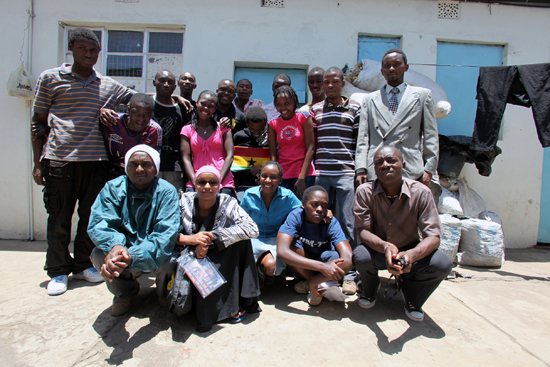“Slum TV”
Shedhalle / Exhibitions / Connect / Artists

Slum TV
Slum TV
A participative media project with more than 40 people contributing, 2007 Initiators: Alexander Nikolic, Sam Hopkins, Lukas Pusch, in collaboration with MYSA (Mathare Youth Sports Association) and UBERMORGEN.COM
Mathare is one of the biggest slums of Nairobi. Approximately 500 000 people live there under
the poorest conditions, having no access to running water or electricity. Life is accompanied and threatened by violence, crime, gang warfare, and social unrest between the ethnic groups. At the turn of the year 2007/2008, when unrests after the controversial presidential elections escalated and international media commented on massacres between Luos and Kikuyus, the local film project Slum TV tried everything to highlight Mathare’s positive sides too, telling everyday stories like the one of Solomon Onyango, a 69-year-old Luo, who stayed in his neighbourhood, in his hut, in spite of all the brutal assaults.
Slum TV is an initiative of the Austrian artists Lukas Pusch and Alexander Nikolic, the Kenyan artist Sam Hopkins, and many more people involved.
In a first step, they taught 12 young inhabitants of Mathare for two weeks how to use video cameras and cutting techniques for the production of their first contributions. Meanwhile, the project has outgrown its beginnings and produces its own newsreels and news coverage, even its own soap opera. Slum TV has become a community project with public screenings at regular intervals, attended by hundreds of viewers, and distributes its productions on CDs and DVDs as well as online. It is a means of self-representation leading to self-empowerment, it has an impact on the individual self-consciousness as well as the solidarity of the inhabitants of Mathare, even depicting moments of hope, too: “Every time when I walk around the slums, people just know me. They see me and they see Slum TV And most of them are like, ‘I have a story to tell you,’ and you want to listen to them. And what they say is: ‘I think my story can help
someone else in the other side of the slum.’” (Esther Wanjiru, interviewed by Matthew Brunwasser / The World)
